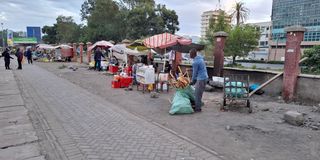Plot thickens as County says traders opted to build own stalls at City market stage

The available space occupied by traders with temporary shelters for stalls on December 17, 2024.
County Trade Executive Stephen Kuria has denied claims of bribery and favouritism in the allocation of stalls at City market stage.
In a phone interview with Mtaa Wangu, Kuria says the allegations of traders contributing upwards of Sh. 50,000 for construction of stalls are untrue, adding that the rumours circulating will not help resolve the issue.
“The county completed construction of stalls numbered one to 14 at Sh 1.9 million. When our funds ran out, we requested traders to wait until we got money for construction, and they proposed a solution,” he explains. “
“As for the other stalls, the traders had agreed to approach their ‘chairpersons’, pull resources, and build the stalls independently.”
When asked why the County would not build the market sheds as required, Kuria says they don’t have money and have allocated more to support other things.

Some complete stalls at the City market stage on December 17, 2024.
“The county government does not have the money to construct all the stalls for the traders, and they have refused to wait for the county to do it. We have allocated Sh. 4 million for this project. But there is now a need to divert those funds to support other projects, like installing cabros (paving blocks) and lighting, to improve the traders' environment and market conditions,” says CEC Kuria.
“There is still plenty of space available for traders to set up their stalls. However, people must be patient because processes cannot be completed overnight,” he adds.
Joseph Kareri, a trader and ‘chairman’, is among those chosen to collect money from fellow traders to support the construction project.
According to Kareri, the traders had agreed that the cost of the metal skeleton structure, along with the roof, would be about Sh. 10,300 per trader.
“The traders have happily contributed this amount to cover the cost of materials and the workforce. It was agreed that any additional adjustments beyond the roof and skeleton would be the responsibility of individual traders, who could continue construction on their stalls,” he says.
He adds that the county completed the construction of fourteen sheds around October 2024, but work was halted and is expected to resume in June due to lack of funds, as told to them.
“On this account, as traders, we requested the county to allow us to construct our stalls. We also raised concerns that once the 14 sheds were finished, new traders might occupy them instead of allowing those who initially occupied the market to continue using the stalls, hence the need to build by ourselves,” says Kareri.
Yvonne Wangari, another trader and 'Chairlady,' explains that the decision to build their stalls was driven by the need to end their suffering from exposure to rain, intense sun, and the theft of their goods.
“We have been taking turns in groups of ten to build our stalls, and we’ve even managed to fully complete one stall where we can store our goods together, which has greatly reduced theft,” Wangari says.

